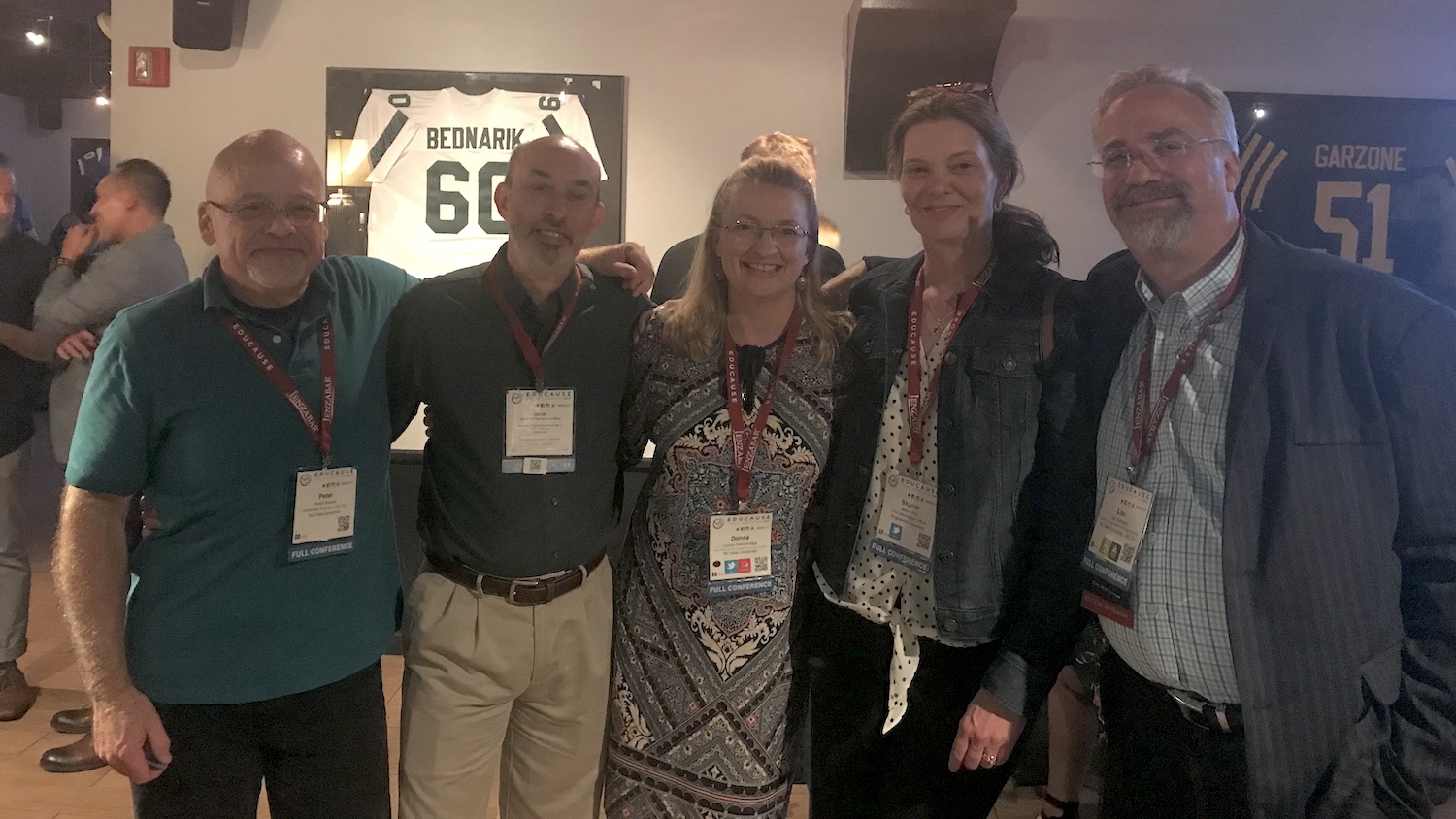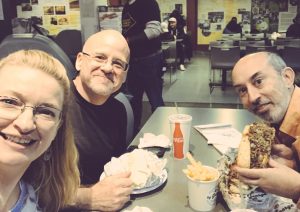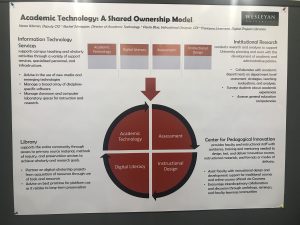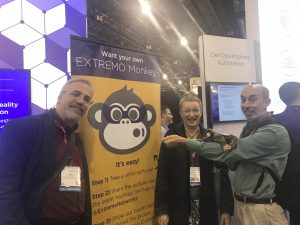EDUCAUSE 2017 Highlights

Lou Harrison, David Howard, Donna Petherbridge and Peter Watson attended the EDUCAUSE 2017 Annual Conference in Philadelphia, Pennsylvania, at the Pennsylvania Convention Center October 31 – November 3, 2017.
The group attended multiple sessions, heard from keynote speakers, interacted with vendors and networked with people from various institutions. The four-day conference had more than 8,000 attendees, so our DELTA staff members were sure to keep busy!

Each DELTA member enjoyed listening and learning from the three general session speakers. The opening day speaker, Michio Kaku, a futurist, physicist, best-selling author and TV personality, presented The Next 20 Years in Education and Technology. Kaku talked about how useful education must focus on concepts, principles and connections as opposed to memorizing facts. Kaku challenged attendees to think about a future where jobs are about selling/providing intellectual capital versus doing the tasks that technology can do for us.
Katherine Milkman, an expert in behavioral economics and the second general session speaker, presented Decision Biases: Improving the Quality of Our Decisions. She discussed how people are inherently biased when making decisions and “choice architecture” shapes our choices. She suggested applying “fun theory” to make choices more appealing and gave the example of a staircase turned into a piano. She encouraged IT professionals to be better choice architects to help guide people to make better decisions. She said in designing our systems, we should:
- Expect and design for errors
- Prompt people to make plans to be accountable
- Leverage social norms
The last general session speaker, Temple Grandin, a professor of animal science and livestock engineer, presented Developing Students Who Have Different Kinds of Minds. Grandin is a prominent author and speaker on autism and animal behavior, and is on the autism spectrum herself. She discussed how important it is to understand that the world needs all kind of minds and to encourage rather than ignore students who are different. She said often what makes students different can make them exceptional. “Her talk was fun, engaging and inspiring — an excellent close to the conference,” said Petherbridge.
Regular Sessions
The group attended numerous sessions including Sneak Peek/Flash Talk: See What Pearson and IBM Watson Are Cooking Up in the Labs. The demonstration featured an interactive quiz in which IBM’s super-computer Watson asked questions and modified responses based on learned replies.
Central Michigan’s Center for Excellence in Teaching and Learning spent a year redesigning their process for working with faculty to design and develop online courses, which was the focus on the session Two Heads Are Better Than One: Reinventing the Online Course Development Process for Quality, Efficacy, and Efficiency. The session noted how they moved from a one-to-one model to a cohort approach to increase efficiency and added peer support and accountability to course development projects.
When Virtual Reality Meets the Classroom: What Happens Next? highlighted Indiana University’s work in setting up learning spaces where students can explore and create virtual, augmented and mixed reality experiences. DELTA staff heard examples, use cases and discussed ideas and constraints for designing spaces to support these activities.
DELTA staff noted it was fun to listen to the Reinventing the Modern University: Lessons Learned from Georgia Tech session as they talked about being willing to take risks and explore ideas. The session was about the “MOOC” model for their very successful online master’s in computer science where students pay a fraction of the cost.
Gravitas & Grit: How IT Leaders Inspire Peak Performance discussed how IT leaders have to understand their own strengths and talents in order to recruit and inspire others to also know themselves. “This was an excellent session with thoughtful leaders in the IT community,” said Petherbridge.
Petherbridge attended the two-hour workshop, A Toolkit for Solving Higher Ed’s Biggest Challenges, as the official NC State representative for this New Media Consortium (NMC) sponsored session. “We spent this time in roundtable discussions focusing on scaling solutions to higher education’s biggest challenges leveraging the NMC Toolkit,” Petherbridge said. Her group brainstormed ideas around scaling evidence-based methods within and across disciplines.
Other notable sessions included Artificial Intelligence and Machine Learning: The “Art of the Possible”, Assessing the Relevance of Your Mobile Student Communication Channel, Beyond “Alternative Credentials”: The Coming Disruption in Career-Aligned, Postsecondary Education, Blockchain: How Can We Use It in Higher Ed?.
Poster Sessions
In addition to regular sessions, EDUCAUSE had two days of poster sessions on a variety of topics. DELTA staff found the following poster sessions notable:
-

Academic Technology: A Shared Ownership Model Poster. Academic Technologies: A Shared Ownership Model was about developing a culture of shared support/encouragement for academic technology regardless if it is located within the IT organization or is separate as a unit or dispersed across campus.
- Action Team Model for Strategic Partnership & Leadership provided a useful handout that noted the types of projects that need cross-campus teams such as reviewing and selecting a new LMS, a mobile-learning project etc. It was worth thinking about for DELTA because of the proactive approach towards partnerships across the institution.
- The EDUCAUSE 2018 Top 10 IT issues gave a preview of the top IT issues with information security at the top of the list. eCampus news summarized the session in this article.
- Video Analytics and Learning Design: Are Students Really Watching Your Videos? was a presentation by Purdue instructional designers and concluded that students who watched the most video content made the best grades.
- What is a CMDB and Do I Really Want One? Demystifying the Configuration Management Database was presented by Wesleyan University on the use of a Configuration Management Database and what software was used to create and manage it.
- IT Governance Checklist session was presented by NC State colleague Debbie Caraway, the College of Sciences director of IT.
- Increasing Student Success, Completion, and Retention through Machine Data and Predictive Analytics was presented by University of Nevada, Las Vegas on an analysis of student data using Splunk software, a data aggregation software that does not truly fall into the category of predictive analysis. The data gathered was used to identify at-risk students.
- Students’ Mobile Learning Practices in Higher Ed: A Multiyear Study: the University of Central Florida study concluded that use of mobile is growing, so courses must be mobile friendly.
Networking and Other Interactions
Part of DELTA’s responsibility at conferences is to interact with vendors and learn about new and evolving products in the enterprise academic technology space. The group attended the Networking Reception in the Exhibit Hall on November 1, which provided two hours of vendor interaction among other interactions prior to and after regular conference hours. DELTA staff also

checked out the Start-Up Alley participants to see emerging educational technology companies for higher education.
Some of DELTA’s highlights from this years vendor meetings and interactions included:
- A Top Hat meeting where the group learned about Ohio State’s implementation of Top Hat and exploration of Open Educational Resources (OER) with this year’s EDUCAUSE Rising Star award winner, Liv Gjestvang.
- DELTA staff learned about other campus’s decisions to use Canvas at a pre-conference meeting with Canvas Instructure on November 2.
- A couple of meetings with Desire2Learn (D2L) focused on DELTA’s partnership with UNC-Chapel Hill to create a competency-based master’s program and gave an opportunity to stay abreast of what is going on with other major learning management systems.
- A meeting with Campus M Technologies to learn more about their mobile delivery platform to deliver unified content and services to campus.
- A conversation with Logicalis provided DELTA with information on uses of ServiceNow beyond the helpdesk, specifically in the form of workflow management.
DELTA staff got the chance to catch up with previous DELTA employees, Sharon Pitt was who was the associate vice provost for learning technology during 2001-2006 and Joanne Dehoney who was the senior director for learning technology during 1998-2001. In addition, Harrison networked with Matt McCurdy formerly of Sonic Foundry and with Desire2Learn currently.
The conference proved to be a great opportunity for networking with colleagues and other institutions facing similar challenges. The group from DELTA noted they had no problem getting over 10,000 steps per day while they explored the convention center and downtown Philadelphia.


